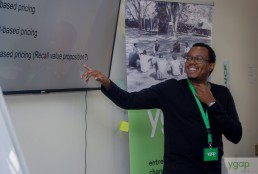Tracking Post-Program Progress
ygap Kenya Accelerator Program Site Visits
From ygap Kenya Impact Officer, Periz Odhiambo
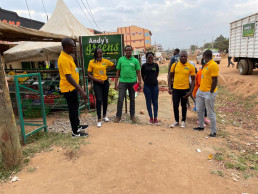
The ygap Kenya team with the team from 2021 cohort venture Andy’s Greens
The ygap Kenya June 2021 program site visits commenced on July 13th with the goal of visiting all the 22 participants in their various venture locations. For ygap Kenya, this marked the start of yet another phase of support through on site one on one strategy sessions to better understand their ventures’ operations and their individual experience after their participation in the bootcamp and to provide guidance and valuable insights on how to manage their sustainability plans, allowing for reflection on their ideas and intentions.
The key takeaway from the 2021 boot camp for a majority was to courageously step out of their comfort zones to explore the possibilities that would better define their venture’s visions and align their goals and activities toward business sustainability, defining their key customer segments, venture’s value propositions and benchmarking to effectively track target expectations with actionable results by comparing one’s own venture’s performance with an industry average, a leader within the industry, or a market segment.
It was notable that all the 22 entrepreneurs were keen to explore, learn and consider new ideas, refine their expectations and apply these experiences to achieve their ventures’ outcome. Despite the uniqueness of each individual founder and their sectors of operations, this exploration and discovery they were experiencing provided a way for the ygap program team jointly with the entrepreneur in session to map out their venture’s strategy to reach their goals.
Click the button below to meet the 2021 Accelerator Program Cohort and learn more about their ventures.
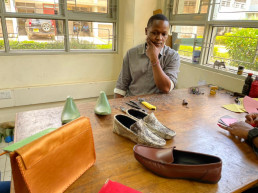
Site visit to Panther Leather in Kisumu
ygap Kenya Accelerator Program 2021
ygap Kenya Accelerator Program 2021
In June of 2021, ygap Kenya began their inaugural Accelerator program with a residential bootcamp of 22 venture founders, selected from 84 applicants. The team had been intentionally targeting recruitment from rural areas and saw an incredible 90.9% of ventures apply from outside Nairobi.
Congratulations to the ygap Kenya team on running such a successful bootcamp, and at nearly double the participant numbers they usually take on in a cohort. Read on to find out more.
The yap Kenya June 2021 program commenced on June 13th with a 5 day intensive live-in accelerator at Lukenya Getaway in Athi River. For ygap Kenya, this marked the start of yet another partnership with The Argidius Foundation for the span of 2021-2023, strategically built around the common goal of helping entrepreneurs establish profitable businesses and contribute to the sustainable development of their communities.
In addition, this was ygap Kenya’s first accelerator run after the COVID 19 Pandemic hit the country in March, 2020. The restrictions imposed by COVID had the program team reschedule to dates (from 23rd May to June 13th) that worked well for the selected participants after the decline of infection rates and the lift of travel restrictions for the live-in accelerator .
The applications for the 2021 program were officially opened on 22nd February 2021 and ran for a period of 3 months. Ygap Kenya garnered a total of 84 applicants for the June 2021 Accelerator Program, majority of them (70%) being from male entrepreneurs. The Kenya program team focused on identifying and selecting the most promising early stage ventures with potential for growth to participate in the 2021 program.

A total of 22 founders (40.9 % female) from different regions were selected with a majority (90.9%) of the ventures based outside of Nairobi. Collectively the participating ventures aligned with various industry sectors- Agriculture (40.9%) Manufacturing/light (18%) and Education (9%) among other sectors. Their solutions proved to provide more holistic support for people in their communities through advocacy in job creation, education, healthy living and home safety.
The ventures also aligned with eight Sustainable Development Goals in total including: SDG 1 (zero poverty) , SDG 2 (zero hunger), SDG3 (Good Health and Wellbeing), SDG4 ( Quality Education), SDG 6 (Clean Water and Sanitation), SDG 7 (Affordable and Clean Energy), SDG8 (Decent Work and Economic Growth) and SDG12 (Responsible Consumption and Production). For over 7 years ygap Kenya has run a total of 13 accelerator programs, with the June 2021 cohort being the largest cohort yet.
For the ygap Kenya June 2021 program, the 5-day intensive workshop component of the program was facilitated by Carol Kimari and Albert Kimani- ygap Kenya’s Country Director and Programs Manager respectively. The accelerator week focused on refining the participating start-ups’ Business Models, building their Theories of Change, Financial Models, MEL Frameworks, Goal Setting, Pitch development, Mental Health & Wellbeing among others. The week concluded with two presentation events, peer review where all the 22 participants got to pitch their businesses to their peers and the demo day event where the top 11 ranked from the peer review got to pitch to judges who were experts in business advisory, recruited by ygap Kenya, to win their votes. The winner of both events was Getrude Kurgat of Gintex Limited.
Throughout the sessions, commitment and active participation were seen to be the key success drivers of the accelerator and this ultimately resulted in a 100% completion rate. Critically, the accelerator program was able to meet its objectives and received tremendous positive feedback from participating ventures with an NPS of 77.8% – highlighting the program’s value to the participants.
– Written by ygap Kenya Impact officer, Periz Odhiambo.
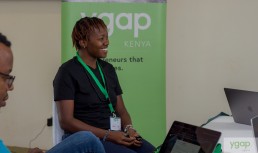
Venture Recovery Stories: BridgeCap Insurance
Venture Recovery Stories: BridgeCap Insurance

60% of Kenyans don’t have access to essential healthcare services and only 40% can afford healthcare services. This is because the current existing healthcare insurance is too expensive. BridgeCap provides affordable and flexible healthcare insurance coverage for low income earners through an easy-to-use technological platform that is accessible both online and on every mobile phone.
How would you describe BidgeCap Insurance?
BridgeCap Insurance is a part of BCFS Group Limited, which also offers financing and advisory services. We are a wholesome financial hub. We provide affordable financial and insurance services to our clients. Bridgecap has three major products – SME loans/ financing, Financial Advisory services and Insurance Brokerage service.
How was the enterprise faring before the onset of the COVID-19 pandemic?
The year had started in a great way and the numbers were great. However, the COVID-19 pandemic entirely changed the shape of business. The financial advisory side of business slowed down, but the insurance side of it picked up. Currently, the insurance business is the one sustaining the enterprise.
What are some of the challenges you have faced during COVID-19, in general as an entrepreneur and as a business?
The COVID-19 pandemic has resulted in an overall reduction in the need for financial advisory services sparked off the loss of a couple of our key clients. The other clients redirected priorities to other business areas besides advisory support significantly affecting our revenues. Initially this was such a tumultuous time for our venture that every company in every industry in every corner of the country and every family was adjusting to loss of income and shifting their priorities to the basics.
How has your business changed or evolved due to COVID-19?
It is during this challenging period that we launched our flagship medical plan, Endelea Plan, which comes in three packages. Under these plans, we have Endelea Jamii to reach the people at the bottom of the pyramid; the uninsured. BridgeCap is working with them to give them financing to run businesses and in turn they can afford the small premium we charge for our cover. This is the social aspect of the business.
We have made health insurance accessible to those who cannot afford to pay in lump sum as we allow our clients to pay in installments enabling them to access world class treatment. We have also enhanced our digital platform capabilities offering our clients options to conveniently access our products and complete transactions through online portal, mobile app and USSD service.
In your own opinion, what is the most significant change that took place with your venture in the past 3 months?
New advisory client acquisition. We have been able to sign a new advisory agreement with the county government and also developed new partnership with a lead insurance company, Jubilee Insurance.
Why was this particular change the most significant to you?
These partnerships have increased our visibility and in turn we have been able to increase the venture’s impact to 350 individual clients with access to insurance cover and 30 enterprises having access to business financing.
What role has ygap played in those changes and / or what are some outcomes your venture has achieved as a result of being supported by ygap?
ygap has actively supported Bridgecap in Marketing Strategy development to increase the ventures visibility on social media. In addition, as a mentee, the external mentorship program offered by ygap has been valuable in terms of engaging mentors who are entrepreneurs as well making it easy for them to relate with some of the challenges a founder goes through and develop workable strategies surrounding these challenges.
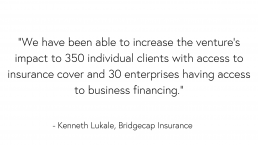
What does the future of your venture look like post COVID-19?
Surprisingly, our insurance has performed better than the previous years. So far, our services are available in over 100 medical facilities. We hope to keep this growth trajectory in the coming years by leveraging on technology. We are working tirelessly to ensure more people in low income areas are able to access good and quality health care by working with hospitals operating in those areas.
What are the key ingredients for successfully overcoming challenges?
A business owner must be “all in,” and willing to devote more than the typical 40 hours per week if they hope to succeed and be open to establishing business partnership. If sales and marketing are not your strong suit, reach out to someone who can advise you on the same.
How have you been able to pivot/adapt so fast in the face of a pandemic?
Throughout the crisis, the healthcare sector has been open and collaborative. The strongest leaders will continue to welcome support from partners and communities to deliver the best possible long-term care. We have been able to reach out to other regional hospitals to engage their patients in insurance conversations and adapt to taking up insurance covers. Bridgecap has also used the lessons learnt during the pandemic to meet future demand for Insurance and Advisory services
What is your advice to other entrepreneurs in regards to adapting/coping during a pandemic?
To always maintain good terms with everyone you work with and create a network in your field that can both help you transition to a new product and give you advice along the way.
I would also recommend an entrepreneur concentrating on the impact of a solution to one small problem and what revenue it will incur. Instead of going after the big problem right from the get-go, take incremental steps, innovating and modifying your prices along the way.
On a scale of 1-10 (1= unlikely and 10= very likely), how likely would you be to recommend other early-stage impact entrepreneurs to look to ygap for support to help grow their ventures? Also why?
I would give it a 9 because the strategy support they give ventures and the willingness to provide that link to experts to address specific venture challenges is valuable in developing future action plans.

Kenneth Lukale of BridgeCap Insurance
BridgeCap Insurance is a ygap Kenya 2020 Program alumni, and recently completed the ygap Re-Accelerator Program, designed to support ventures through the effects of COVID-19.
Resiliency in Action
Resiliency in Action
How ygap Australia Ventures are adapting to COVID-19
ygap is continuing to support our local impact ventures as they adapt to the challenges of COVID-19. A number of our alumni ventures across Australia are responding to the pressing needs of the community in different ways, from connecting university students with work and volunteering opportunities, to running financial health checks for businesses, to launching a range of local-led COVID-19 response projects overseas. Check out the list below to discover how some ygap Australia ventures are pivoting or diversifying their products and service offering to take advantage of the situation and inspiring resiliency in action.
Homegirls is a social enterprise that gives refugee and asylum seeker mums a sense of agency and social connectedness by creating collaborations with local designers to create statement earrings. We are launching a new product offering in the form of ‘make it at home’ earring care packages. These packages will assist in response to the COVID-19 pandemic in three ways;
1. Supporting local businesses by purchasing materials and tools for the care packages;
2. Supporting the Australian community by providing a creative outlet and relieve stress that may arise from social distancing and home isolation;
3. Ensuring the financial sustainability of our operations and providing our beneficiaries with continual income during this time, and the development of a novel product offering that will continue after this pandemic has ceased.
Halad to Health is an international NGO closing the gap in global health inequality through delivering accessible health education services. We do this through our affordable GAMSAT Tuition and Biomedicine Exam Revision Services. All funds raised from these services go to the Halad to Health Foundation Philippines, to give free health education to students in rural Philippines.
In Australia we run more affordable GAMSAT tuition services for students looking to study medicine and dentistry. Proceeds from our GAMSAT tuition services as of April 2020 will be temporarily diverted to support front-line healthcare workers fighting the COVID-19 pandemic.
Free to Feed delivers a number of food-oriented initiatives. We host authentic food experiences and workshops, we run events and provide catering.
Each month, the incredible kitchen and participant team at Free to Feed will be cooking a delicious rotating menu of nourishing, home-delivered BRAVE MEALS available for pick-up or local delivery on Wednesdays and Fridays. These meals have been conceived by our participants and chefs to nourish families in difficult times to help you bring your loved ones close. Meals made by Free to Feed are cooked with love to keep you in good health.
Goodie actively connects young volunteers with volunteering opportunities offered by nonprofits and social enterprises.
We are currently chatting to our charity partners who are assisting during this pandemic with food, mental health, housing and other services. We would be hoping to provide these charities with volunteers who can safely aid, including the possibility of aid from a remote-working arrangement.
This is still being discussed with the charity partners so if anyone knows of any charities, social enterprises or not-for-profit organisations that are requiring assistance, please let us know. Alternatively, if any of the other ygap cohorts and startups would like to put their hand up to volunteer and help out during this time, please let us know and we can aim to connect you with a charity partner in a safe and secure environment.
ARMCare provides disability support services under the NDIS to refugees and migrants with a refugee background in Brisbane, in a culturally-appropriate manner. We provide employment for former refugees, so that they can provide care for clients who speak the same language(s). Our services go beyond those funded by the NDIS by providing health care coordination, health advocacy, and social support to clients. We also help former refugees to access the NDIS and advocate for them so that they obtain quality plans and adequate funding. Our NDIS-funded Support Coordination service educates clients as to the services available, and enables them to implement their plans, receive their choice of supports, understand their rights, and make changes when necessary.
ARMCare continues to provide Support Coordination, disability supports to those whose needs are critical, advocacy for people needing NDIS plans, and social support for clients and their families.
Financially Empowered’s mission is to equip ALL women with skills to enable them to be financially literate, sustainable and independent. We empower women to manage their business or personal cashflow, set financial goals, and we provide CFO services to women in business. Financially Empowered also runs a ‘Money Matters for Migrants’ program to help remove the barriers that disenfranchised women face when it comes to dealing with finances.
We are launching a Financial Health Check service to help businesses navigate financial decisions they need to make in response to COVID-19. The check will include reviewing their current systems, cashflow management, cost savings, forecasting in uncertain times and understanding their breakeven point. To book your session email: admin@financiallyempowered.com.au
MoneyGirl is dedicated to improving the financial literacy of every young woman in Australia. MoneyGirl provides workshops covering multiple areas of money. From big financial decisions like investing and choosing financial advisors, right through to everyday budgeting, MoneyGirl provides everything you need to start on the right path. When you join the MoneyGirl community, you’ll be joining a sisterhood of smart, savvy and supportive young women to help you on your journey.
We host a weekly virtual MoneyHang for the community to share money concerns and knowledge. Together we figure out ways to support each other, and build our resilience to thrive during and after the pandemic.
We have live online chats with experts to answer the community’s questions about their money in relation to the pandemic which includes investing during a market down time, understanding the government stimulus package, and more.To stay in-the-know about what’s coming up next, join the MoneyGirl community here: https://www.moneygirl.co/individuals/#join-our-community
Just Peoples connects Australians with grassroots, locally-led micro-projects overseas. We connect people with a project that matches their values and support them to donate or fundraise and be the one to make it happen!
We are launching a range of Covid-19 response projects developed by our local project leaders to meet the needs in their communities as the pandemic unfolds, and reaching out to our supporters in Australia to fundraise for and donate towards these. See justpeoples.org/covid-19 for more details
Bring Me Home is a mobile app that connects people with nearby food retailers
that have surplus food to sell at a discount. Bring me Home is supporting their vendors and partners in the hospitality industry who have been hard-hit by the pandemic through:
1.Reduced commission
To help alleviate some financial pressure, we are cutting our commission by 5% from the start of April for 3 months, or until further notice.
2. Advertise takeout offers
Got all-day takeout meals and menu deals? You can now advertise them on the BMH app by creating a second listing.
3. Sell excess supplies & ingredients
If you are finding that non-perishables are going to waste and you are throwing away ingredients at the end of the day, you can list a “mystery box” of ingredients on the BMH app with a second listing.
At Qonfr, we facilitate connections between people with mental health challenges and companions (peer supporters) based on shared lived experiences. We do this by harnessing the lived experience of mental ill-health and recovery to support others going through similar challenges while fostering a sense of hope and understanding. Companions – traditionally called Peer supporters – provide support in the form of accompaniment, a shoulder to lean on, a sympathetic ear and friendly conversations. At a time of panic, anxiety and distress caused by the COVID-19, we are working towards creating purposeful connections that help alleviate the growing atmosphere of social isolation.
During such distressing and fast changing situations, we would like to focus on our purpose of eliminating social isolation and thus, waive off any fees/surcharges/commission gained from facilitating connections between the customers and the companions. Essentially, it would be completely FREE to get a companion!! We would also encourage companions to waive any fees associated.
Robofun is a Melbourne based robotics and coding academy for kids with a gender focus offering affordable and fun 3D-Design and Coding classes. Robofun have taken their classes from face to face to online allowing them to now operate nationally. By leveraging tech, students can refer back to recorded classes, as well as address ongoing challenges via ClassDojo which enables parents to communicate directly with instructors. The small group classes are a fabulous educational hour for kids to spend online learning with family and friends.
Anika Legal is a tax-deductible charity and social enterprise providing free, effective legal assistance to those who can’t access it, through practical legal training and trusted partnerships. In light of the pandemic, Anika Legal is providing free legal advice to tenants who are experiencing hardship due to COVID-19.
Anika has found that while many Victorian tenants are suffering, relatively few are aware of the free services available to them to give them a better chance at safe and secure housing. Visit their website and social media for more information.
An important Update regarding ygap and Covid-19
An important update regarding ygap and COVID-19

How we're responding to the outbreak.
As we continue to navigate the uncertainty of a global pandemic, the team at ygap would like to share an update about our programs and some of the actions we are taking to help maintain the health and safety of everyone associated with our work.
Our highest priority at ygap is the well-being, safety and security of our staff, partners, entrepreneurs and those in the communities in which we work. Given the declaration of COVID-19 as a pandemic by the World Health Organisation, we are continually assessing what this means for our work, the ventures we support and the wider communities those ventures work within. In light of this, we have developed an internal policy on how to best mitigate the risks associated with this outbreak and have made a number of amendments to our current and upcoming programs. These measures are preventative in nature and what we believe is the best way to support the wellbeing of those associated with ygap.
-
As an organisation we are well prepared and well equipped to continue operating under a ‘work from home’ mandate. As such, we have directed all global ygap staff to do so until such a time as the World Health Organisation or other relevant authority declares that the threat has adequately subsided.
-
The upcoming ygap Bangladesh and ygap South Africa programs, which were scheduled to begin in April and May respectively, will complete the current recruitment and selection process which is conducted entirely online. However, we will be postponing the start-date of these two programs until such a time as we can assure the health and wellbeing of participants. The yher Pacific Islands and ygap First Gens programs scheduled to begin in July will continue with the recruitment process. We acknowledge that some changes may need to be implemented to these programs, but we will be making no program changes at this time. We will continue to reassess these programs in an ongoing manner.
-
In regards to ygap programs that have already commenced, we have made the decision to postpone all associated face-to-face gatherings, including site-visits, masterclasses, bootcamps and alumni events. However, this does not mean that the program itself is cancelled or postponed. Teams will continue to provide assistance to current program participants through our remote tailored support including operational and strategic advice, mentoring and coaching calls, and access to small grants.
Whilst there is no precedent for what is happening at the moment, ygap sees such precautions as essential given the countries and regions we work across, as well as the communities we work alongside, who may be more vulnerable to a public health crisis. At the same time, we must keep in mind that this pandemic is set to have a significant impact on small business and vulnerable populations, making ygap’s work, both now and in the long term, more important than ever.
In such uncertain times we can only take each day as it comes, look after our health, and practice kindness and generosity towards others. Already we have seen some wonderful acts of humanity as we navigate the unknown. Let’s do all that we can to ensure this trajectory continues.
The state of social enterprise in Kenya
The state of social enterprise in Kenya

By ygap Kenya Program Manager Carol Kimari.
The genesis of the social enterprise movement in Kenya can be traced back to the 1980s when the country began to experience significant economic restructuring. This is what was popularly known as the structural adjustment programs (SAPs). With reduced government expenditure in areas considered as essential social services, many non-state actors came up to plug into the gap created by these policy changes.
According to a study by the British Council conducted 2016 “State of Social Enterprise in Kenya,” at the time, there were over 44,000 social enterprises in Kenya. Since then, the growth has been significant, and the number could have doubled by now. The social enterprise ecosystem in Kenya is driven by young people under 35 years attributed to the high literacy levels and lack of employment opportunities.
Take an example of the last cohort of ygap 2020 accelerator; more than half of the entrepreneurs were people under 35 years. The primary objectives of these social enterprises are to respond to the needs in their communities; create employment, increasing financial inclusion, enabling small businesses create value, helping parents access better pre & post-natal care, addressing literacy levels especially in marginalized groups and communities, helping farmers access better markets and farm inputs, and helping young women access employable skill among others.
The greatest barrier to early-stage social enterprises in Kenya continues to be lack of access to capital. In Kenya, many financial institutions are reluctant to give financing to these enterprises. Most financial institutions feel that these enterprises are high risk owing to the fact that they don’t have assets they can attach to the loans. This has slowed down the growth of many enterprises. ygap Kenya, as an early startup accelerator tries to validate their impact and business models to make them more investable and attractive to financing entities. We do this by giving grants to test ideas/ products and overcome early stage growth barriers and connect them to growth funders.
However, although funding is one of the biggest barriers, the lack of government policy or legislation specifically aimed at social enterprises in Kenya is also a big challenge. There are small steps being made like changing the age of directorship in companies from 21 years to 18 years. This means younger people can own businesses without age limitation. This has led to more people registering businesses and according to the same report, State of Social Enterprise in Kenya, more women are running social enterprises. Such policy changes have seen almost half (44%) of the enterprises in Kenya are being run by women most of them under the age of 35 years.
Carol at the recent ygap Kenya Program

The rapid growth in the sector has seen the need to build apex bodies/ organizations that seek to support the sector players better realize their respective social missions in supporting social enterprises. These organizations support their members by organizing seminars where people can learn new ways of doing business, networking event and policy lobbying. Among them are Aspen Network of Development Entrepreneurs (ANDE), Project, East Africa Social Enterprise Network (EASEN) and the Social Enterprise Society of Kenya (SOSEK). All these have been instrumental in creating a more organized ecosystem. Member organizations like the Business Network International which is a business referral organization that sees only one organization working within a specific field being admitted to a certain chapter. This greatly favors social enterprises because of referrals from other members and reduced competition. Sankalp Africa summit is a global forum that has created an ecosystem of entrepreneurs, investors, corporations, multilaterals and policy makers who are committed to furthering the cause of development through entrepreneurship and innovation, and brings them together to initiate dialog and enable action through innovation and entrepreneurship at the base of the pyramid across five high impact sectors: Agriculture, Food & Rural Businesses, Education, Clean Energy, Health, Water & Sanitation, and Technology for Development. This year’s summit in Nairobi saw Ygap Kenya’s four entrepreneurs exhibit their work. This exposure is a follow up to the capacity building programs that Ygap takes the entrepreneurs through to make them investment ready.
As the Kenyan social enterprise space continues growing, it has attracted a host of social enterprises support mechanisms like; incubators, accelerators etc. Kenya Climate Innovation Centre, LakeHub (which was part of ygap 2020 accelerator), Intellecap are among the leading incubators in Kenya. We have also seen the emergence of new concepts like impact investing which is still gaining traction in the country. There are also plenty of co-workspaces in Kenya like the Kijiji that encourage social enterprises to thrive by offering affordable co-working spaces.
Finally, the emergence of social media as a marketing and communication tool has been a revelation for most of social enterprises. It is now the norm to see a social enterprise set up social media pages to share information and market their products either through Facebook or Instagram. For one of the enterprises we support, Soi Designs, the primary marketing tool is social media. This is great because most of them cannot afford traditionally mainstream marketing platform like newspapers, and magazines.
Social enterprises are rapidly growing in Kenya and these enterprises span out in almost all sectors of the economy- giving investors a cocktail of options to venture in. Adequate funding in social enterprises would provide the necessary leverage as most of them are at a tipping point.
Entrepreneurs from the ygap Kenya Program 2020


